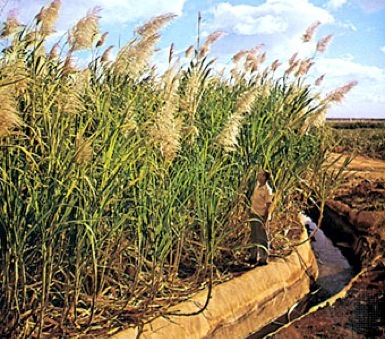A Closer Look at Sugar and Cane in the Global Food Industry
A Closer Look at Sugar and Cane in the Global Food Industry
Blog Article
Why Cane Sugar Processing Chemicals Are Critical for Modern Sugar Refining
The role of cane sugar processing chemicals in contemporary sugar refining can not be overstated, as they are integral to improving both the effectiveness of extraction and the general high quality of the last product. Representatives such as phosphoric acid and specific flocculants are used to eliminate contaminations, resulting in sugar that not only meets customer assumptions however likewise sticks to sector requirements.
Role of Processing Chemicals
The effectiveness of cane sugar handling hinges considerably on the critical application of processing chemicals. These chemicals play a crucial function in boosting the performance and quality of sugar removal and refining. From the first stages of juice removal to the final purification steps, handling chemicals assist in various vital operations.
In the extraction phase, chemicals such as phosphoric acid and calcium hydroxide are used to optimize the information process, assisting to get rid of pollutants and put on hold solids from the walking cane juice. This not only boosts the yield but additionally ensures the clearness of the last product. Additionally, representatives like flocculants help in the quick settling of pollutants, consequently enhancing the total procedure.
As the processing advances, chemicals are used in decolorization and condensation stages. Triggered carbon and ion exchange materials serve to eliminate shade and odor, ensuring that the refined sugar satisfies customer top quality criteria. Eventually, the duty of processing chemicals prolongs beyond operational effectiveness; they substantially influence the sensory characteristics of the last product, adding to market competitiveness. Thus, the precise choice and application of these chemicals are crucial for attaining optimal end results in walking stick sugar handling.
Key Sorts Of Chemicals
Walking stick sugar handling depends on a variety of essential chemicals that assist in each phase of manufacturing. These chemicals play essential roles in clearing up, lightening, and cleansing the sugar extracted from walking stick.
One key category of chemicals includes flocculants, such as polyacrylamide, which help in the explanation procedure by advertising the gathering and settling of contaminations. Furthermore, calcium hydroxide is often employed to reduce the effects of level of acidity and help in the elimination of non-sugar parts.
Lightening representatives, such as triggered carbon and sulfur dioxide, are made use of to decolorize the syrup, causing a more clear last item. These chemicals aid eliminate color substances that might impact the sugar's appearance and bankability.
Furthermore, phosphoric acid works as a pH regulatory authority throughout the handling phases, making certain optimum problems for the chemical activities associated with sugar extraction and filtration.
Other important representatives include edta (ethylenediaminetetraacetic acid), which chelates steel ions that might catalyze unwanted reactions, and salt hydroxide, which assists in pH control throughout the refining procedure. Collectively, these chemicals enhance performance and guarantee a high-grade walking stick sugar product.
Advantages for Sugar Quality
Often forgotten, making use of particular handling chemicals considerably boosts the general high quality of walking cane sugar. These chemicals play a critical duty in refining processes, ensuring that the end product fulfills stringent sector standards for pureness and taste.

Additionally, processing chemicals aid in achieving a consistent granulation and structure, which are important for consumer acceptance. By controlling the crystallization process, these chemicals ensure that the sugar crystals form uniformly, leading to an extra appealing product that liquifies well in numerous applications.
Additionally, the use of these chemicals can improve the rack life of walking stick sugar by reducing dampness absorption and microbial development. Generally, the calculated application of processing chemicals is important for supplying high-grade walking stick sugar that satisfies consumer assumptions and market needs.
Ecological Impact Factors To Consider

In addition, the energy-intensive nature of sugar refining, compounded by chemical usage, often leads to boosted carbon exhausts. This adds to environment adjustment and raises worries pertaining to the sustainability of existing refining techniques. In addition, the sourcing of these chemicals might entail practices that threaten biodiversity, such as monoculture farming, which reduces the resilience of farming communities.

To alleviate these effects, sugar refiners are significantly discovering sustainable options and taking on finest methods that minimize chemical usage. Implementing rigorous ecological administration systems can assist guarantee that the refining process straightens with environmental standards and advertises biodiversity. Eventually, a balanced approach that focuses on both sugar high quality and environmental stewardship is important for the lasting feasibility of the sugar market.
Future Trends in Refining
As the sugar industry comes to grips with the environmental obstacles connected with conventional refining approaches, cutting-edge methods are arising to improve both efficiency and sustainability. One considerable pattern is the adoption of eco-friendly chemistry principles, which focus on making use of safe, eco-friendly processing chemicals. This change not only decreases environmental influence but likewise addresses customer demand for cleaner manufacturing techniques.
Another encouraging development is the application of innovative filtration modern technologies, such as membrane layer separation and adsorption procedures. These strategies improve the clearness and top quality of the sugar while lowering the volume of wastewater produced throughout refining. Additionally, the combination of electronic innovations, consisting of IoT and AI, is transforming operational effectiveness by recommended you read making it possible for real-time monitoring and anticipating maintenance, therefore lessening source waste.
Moreover, making use of by-products from sugar refining, such as bagasse and molasses, is getting grip. These products can be transformed right into biofuels or value-added products, adding to a round economy within the market. Jointly, these patterns signify a shift in the direction of even more lasting practices that not just boost operational efficiency but also align with worldwide sustainability objectives, ensuring the future practicality of sugar refining.
Final Thought
Walking cane sugar handling chemicals are important in modern sugar refining, considerably improving the performance and quality of sugar removal. The strategic use these chemicals not only her comment is here boosts the purity and flavor of the final item yet additionally makes certain consistent condensation and texture. As the industry significantly focuses on sustainability, the fostering of environmentally-friendly handling representatives is most likely to shape future trends in refining, ultimately resulting in better products and expanded life span for customers.

Eventually, a well balanced technique that prioritizes both sugar quality and ecological stewardship is essential for the long-lasting feasibility of the sugar market.
Cane sugar processing chemicals are vital in modern-day sugar refining, significantly enhancing the performance and high quality of sugar extraction.
Report this page